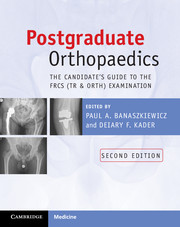Book contents
- Frontmatter
- Contents
- Contributors
- Foreword
- Preface to second edition
- Abbreviations
- Section 1 The FRCS (Tr & Orth) examination
- Section 2 The written paper
- Section 3 The clinicals
- Section 4 The adult elective orthopaedics oral
- Section 5 The hand oral
- Section 6 The paediatric oral
- Section 7 The trauma oral
- Section 8 The basic science oral
- Section 9 Miscellaneous topics
- Chapter 23 Surgical exposures oral core topics
- Chapter 24 Anatomy oral core topics
- Chapter 25 SAS doctors and the FRCS (Tr & Orth) exam
- Chapter 26 FRCS (Tr & Orth) and CESR (Article 14)
- Chapter 27 Candidates' accounts of the examination
- Chapter 28 Examination failure
- Index
Chapter 27 - Candidates' accounts of the examination
from Section 9 - Miscellaneous topics
- Frontmatter
- Contents
- Contributors
- Foreword
- Preface to second edition
- Abbreviations
- Section 1 The FRCS (Tr & Orth) examination
- Section 2 The written paper
- Section 3 The clinicals
- Section 4 The adult elective orthopaedics oral
- Section 5 The hand oral
- Section 6 The paediatric oral
- Section 7 The trauma oral
- Section 8 The basic science oral
- Section 9 Miscellaneous topics
- Chapter 23 Surgical exposures oral core topics
- Chapter 24 Anatomy oral core topics
- Chapter 25 SAS doctors and the FRCS (Tr & Orth) exam
- Chapter 26 FRCS (Tr & Orth) and CESR (Article 14)
- Chapter 27 Candidates' accounts of the examination
- Chapter 28 Examination failure
- Index
Summary
General examination experiences and advice
‘Firstly, bear in mind that the view of the exam is entirely dependent on how you feel it went, and whether you pass. With this in mind, I can say that I felt that both the MCQ and clinicals and vivas were fair, with nothing unexpected. However, it's easy to say that in retrospect, and my view without a pass would be entirely different.’
‘The exam is about seeing if you are ready to be a day 1 general orthopaedic consultant in a district general hospital.’
It is important to remember that you do require a huge amount of knowledge to pass the FRCS (Tr & Orth) and this takes preparation. However, the examiners are looking for candidates who have a solid grounding in the principles of orthopaedic and trauma surgery, and you are expected to convey to them that you are safe, sensible and logical. Keep this in mind when studying to keep things in perspective. You can't and won't be expected to know everything.
- Type
- Chapter
- Information
- Postgraduate OrthopaedicsThe Candidate's Guide to the FRCS (Tr and Orth) Examination, pp. 576 - 591Publisher: Cambridge University PressPrint publication year: 2012



